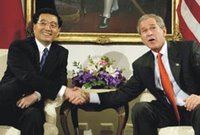Hu Comes to Town
 Finally back in Stockholm after a week in Washington and Baltimore.
Finally back in Stockholm after a week in Washington and Baltimore. But tomorrow will be important over there as Chinese President Hu Jintao arrives in Washington on a visit of some importance.
It's not the great drama around these visits that it used to be. Meetings with the President of China are fairly common occurences these days. It wasn't long since President Bush was in Beijing.
Nevertheless it looks as if a minor diplomatic battle has been going on concerning the formal nature of this visit. The Chinese wants it to be a "state visit", but the Americans insist it's only an "official visit".
But as a compromise President Hu will be given a 21-gun salute when he arerives aty the White House - although no state dinner.
It's primarily in the monetary and trade field that the visit will be important.
During the decades of the cold war, relations between the United States and the Soviet Union was based on the mutual fear of total physical destruction. Both had the capability to totally destroyed the other within, say, 30 minutes.
With China it's obviously different. Here there is the fear of mutual financial destruction that comes into the picture. It's perhaps not the ability to destroy the other, but at the least to make substantial harm.
The prevailing view here in the US is that the Chinese policy of keeping its currency at a fixed exchange rate with the dollar is doing serious harm to the US economy. The theory is that it keeps the currency undervalued, thus making Chinese exports to the US even more competitive than they otherwise would have been.
In the prevailing semi-protectionist mood in the US, that has political consequences. There is strong pressure on the President Hu to announce some increase in the very limited exchange rate flexibility, but real expectations that he will bow to US pressure on this point are low.
If the results of the meeting are seen to be too limited, there is a risk that this will trigger different US countermoves. This might not be driven by the White House, but by a Congress where the November election prospects are starting to dominate everything.
And if this were to happen, there is a very real risk of a trade war between the United States and China with potentially very serious consequences for the ongoing Doha global trade talks as well as the overall sentiments on the free trade issues.
President Hu is primarily concerned with his domestic agenda of stability, in a way not too dissimilar to the preoccupation with his domestic agenda that President Bush has at the moment.
One would hope that they would both raise over these agendas and see the responsibility they share for not starting a circle of actions that might descend into a trade war with very negativa consequences.
We should wish them good luck in those efforts.


<< Home